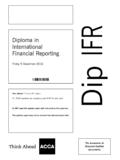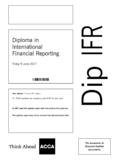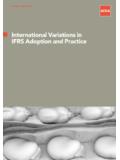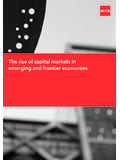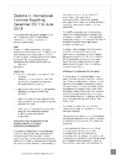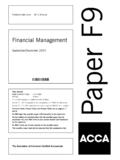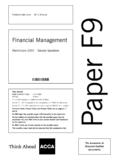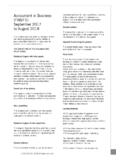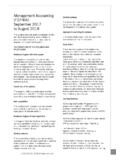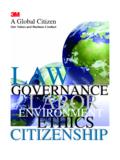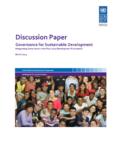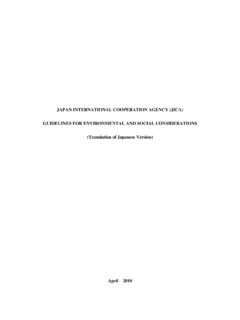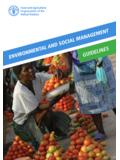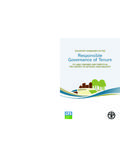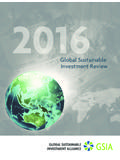Transcription of Integrated reporting: the influence of King III on …
1 Integrated reporting : the influence of King III on social , ethical and environmental reportingThis study analyses the annual reports of 10 major South African companies listed on the Johannesburg Stock Exchange (JSE) to assess the impact of the required introduction of Integrated reporting on social , environmental and ethical reporting . ACCA (the Association of Chartered Certified Accountants) is the global body for professional accountants. We aim to offer business-relevant, first-choice qualifications to people of application, ability and ambition around the world who seek a rewarding career in accountancy, finance and management. We support our 154,000 members and 432,000 students throughout their careers, providing services through a network of 83 offices and centres. Our global infrastructure means that exams and support are delivered, and reputation and influence developed, at a local level, directly benefiting stakeholders wherever they are based, or plan to move to, in pursuit of new career opportunities.
2 Our focus is on professional values, ethics, and governance, and we deliver value-added services through our global accountancy partnerships, working closely with multinational and small entities to promote global standards and support. We use our expertise and experience to work with governments, donor agencies and professional bodies to develop the global accountancy profession and to advance the public interest. Our reputation is grounded in over 100 years of providing world-class accounting and finance qualifications. We champion opportunity, diversity and integrity, and our long traditions are complemented by modern thinking, backed by a diverse, global membership. By promoting our global standards, and supporting our members wherever they work, we aim to meet the current and future needs of international ACCAThe Association of Chartered Certified Accountants, London, 2012 Integrated reporting : the influence of King III on social , ethical and environmental reportingJill SolomonandWarren MarounACCA considers this study to be a worthwhile contribution to discussion but do not necessarily share the views expressed, which are those of the authors alone.
3 No responsibility for loss occasioned to any person acting or refraining from acting as a result of any material in this publication can be accepted by the authors or publisher. Published by ACCA, 29 Lincoln s Inn Fields, London WC2A 3EE. ACCA, August 2012 AcknowledgementsWe are grateful to ACCA for funding this research and especially to Rachel Jackson (head of sustainability, ACCA) and Paul Moxey (head of corporate governance and risk management, ACCA) for their inspiration and support throughout this project. We are also grateful to a number of people who have discussed the report with us, including Professor Michael John Jones (University of Bristol), Professor Richard Laughlin (King s College London) and Ioannis Tsalavoutas (University of Stirling) as well as to delegates at the British Accounting & Finance Association Special Interest Group on Corporate Governance conference in February 2012 and those at the British Accounting & Finance Association Annual Conference in April 2012, for their helpful suggestions.
4 Also thanks to John Jones for preparing the manuscript for the authorsJill Solomon is professor of accounting and financial management at Henley Business School, University of Reading (from September 2012) having previously been professor of corporate governance and accountability at King s College London, University of London. Her primary research interests include institutional investor engagement and dialogue, responsible investment, stakeholder accountability, pension fund governance and sustainability issues in accounting and finance. Before moving to King s College in 2009, Jill lectured at Cardiff University and Sheffield University. She gained a PhD from the University of Manchester in 1996 in International Finance. Jill enjoys an active involvement in the evolution of corporate governance and accountability both in the academic and practitioner spheres and chairs the British Accounting Association Special Interest Group on Corporate Governance.
5 She is also a member of the ACCA Governance Risk and Performance Global Forum. Jill s best-selling textbook Corporate Governance and Accountability is entering its forth edition in Maroun is a chartered accountant (South Africa) and holds a honours degree in taxation and masters degree in accountancy. He joined PricewaterhouseCoopers in 2006 and the University of the Witwatersrand in 2010 where he serves as a senior lecturer in financial reporting . He is currently completing his doctorate in accountancy at Kings College London. EXECUTIVE SUMMARYINTEGRATED reporting : THE influence OF KING III ON social , ethical AND environmental REPORTING5importance of materiality; an evolving discourse of risk and risk management; an increasing tendency towards quantification; the emergence of new reporting items; the emergence of new sections in the reports; the increasing integration of social , environmental and ethical information into corporate governance; Integrated reporting as an evolutionary process; and the evolving assurance of the social , environmental and ethical information in the reports.
6 The reports are imbued with stakeholder accountability rhetoric. Within a couple of years companies have shifted from an approach to reporting aimed primarily at shareholders to one that expounds the directors belief in stakeholder accountability and stakeholder engagement. The introduction of Integrated reporting appears to have created a new set of priorities for the directors, expressed through the reporting . The present study recognises that the emergence of Integrated reporting presents new opportunities but also new challenges for the sustainability reporting agenda. While the existence of an Integrated report should embed sustainability reporting in the heart of the primary corporate reporting vehicle, the annual report, this does not necessarily imply that the reporting will fulfil its potential for transforming corporate behaviour or will not result in empty rhetoric.
7 This study analyses the annual reports of 10 major South African companies listed on the Johannesburg Stock Exchange (JSE) to assess the impact of the required introduction of Integrated reporting on social , environmental and ethical reporting . The findings paint a complex picture of this impact, showing both positive and negative effects. There is a significant increase in the quantity of social , environmental and ethical information reported in the annual reports of the sample companies. social , environmental and ethical information appears throughout in a significantly greater number of sections of the reports for 2010/11 than of those for 2009. In the earlier reports, this information tended to be restricted to specific sections, usually a sustainability report and a mention in the chairman s statement. Subsequently, a striking weakness in the integration of social , environmental and ethical information is the way in which certain items of information are repeated, often excessively, throughout the reports.
8 There has also been a substantial increase in the reporting of social and environmental information compared with ethical information. From an interpretative analysis of the reports a number of themes have been extracted, characterising the impact of the introduction of Integrated reporting on social , environmental and ethical reporting . These included the crucial Executive summaryContentsExecutive summary 51. Introduction 62. The evolution of Integrated reporting 73. Research method 104. Research findings 125. Concluding discussion 51 References 546 There has been a steady evolution in social , environmental and ethical reporting over the past four decades, with the development of sustainability reporting growing significantly in the last decade. Since the turn of the century there has been an increasing emphasis on transcending stand-alone social , environmental , social responsibility and sustainability reporting such that companies are expected to achieve integration of sustainability and governance information within the annual report.
9 Such integration is deemed essential if businesses are to embed stakeholder accountability into the heart of their operations in a meaningful way. There has been some level of integration in reporting by UK companies, on a voluntary basis, spurred on by the development of the Accounting for Sustainability (A4S) Connected reporting Framework in 2007. The first national attempt to enforce Integrated reporting across all listed companies was, however, that introduced in 2010 by the Johannesburg Stock Exchange (JSE), which mandated Integrated reporting through its listing requirements via compliance with the King III Report (2009). South Africa has long been recognised as a pioneer in promoting corporate governance reform, with the first King Report (1994) heralding a new departure in stakeholder accountability. As a result of political, social and environmental challenges, South Africa has taken a lead, through its stakeholder-oriented corporate governance reports, in forcing businesses to embed social , environmental and governance considerations into the heart of their operations.
10 King II (2002) suggested further integration of sustainability into governance and reporting but in 2009, King III insisted on Integrated reporting for companies listed on the JSE and, through the JSE listing requirements, companies are therefore obliged to produce an Integrated report. The International Integrated reporting Council concluded a series of meetings in Brazil in November, 2011, marking a new phase in the initiative to develop an internationally accepted Integrated reporting The present study analysed the content of a sample of Integrated reports, produced since the publication of King III, from among the largest listed companies on the JSE and compared them with the reports produced in 2009. The aim was to explore the impact of the introduction of Integrated reporting on social , environmental and ethical reporting within the annual reports of South African companies in order to assess the extent of any increase in the quantity of reporting , as well as to provide a qualitative overview of changes in the reporting since its introduction.

